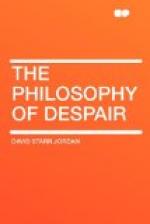“Can it be, O Christ in Heaven,
That the highest suffer most,
That the strongest wander farthest
And most hopelessly are lost? —
That the mark of rank in Nature
Is capacity for pain,
And the anguish of the singer
Marks the sweetness of the strain?
That this must be so rests in the very nature of things. The most perfect instrument is one most easily thrown out of adjustment. The most highly developed organism is the most exactly fitted to its functions, the one most deeply injured when these functions are altered or suppressed.
Man’s sensations and power to act must go together. Man can know nothing that he cannot somehow weave into action. If he fails to do this in one form or another, it is through limitations he has placed on himself. Man cannot suffer for lack of “more worlds to conquer,” because his power to conquer worlds is the product of his own ’past life and his own past needs. To weave knowledge into action is the antidote for ennui. To plan, to hope, to do, to accomplish the full measure of our powers, whatever they may be, is to turn away from Nirvana to real life. A useful man, a helpful man, an active man in any sense, even though his, activity be misdirected or harmful, is always a hopeful man.
The feeling that “the only reality in life is pain,” is the sign not of philosophical acuteness but of bodily under-vitalization. The nervous system is too feeble for the body it has to move. To act is to make the environment your servant. Its pressure is no longer pain but joy. The concessions which life has made to time and space are the source of life’s glory and power.
The function of the nervous system is to carry from the environment to the brain the impressions of truth, that action may be true and safe. Pain and pleasure are both incidental to sound action. The one drives, the other coaxes us toward the path of wisdom. If pain is in excess of joy in our experience, it is because we have wandered from the path of normal activity. By right-doing, we mean that action which makes for “abundance of life,” and abundance of life means fulness of joy. “Though life be sad, yet there’s joy in the living it” was the word of the ancient Greeks, “who ever with a frolic welcome took the Thunder and the Sunshine.”




